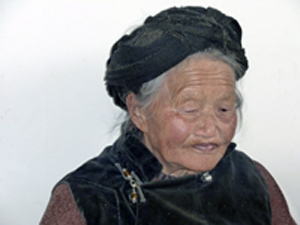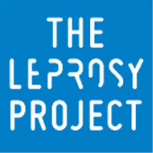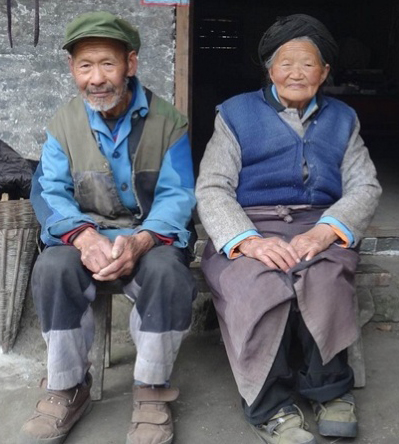
“I was born in 1931 in a village near Kang Le (the leprosy rehab village where Liu lives now). I have one sister and three brothers. Children were not able to go to school in those days. My eldest brother worked in the landlord’s home to support the family. My mother passed away when I was five years old. I had too many siblings. My father could not afford to feed so many mouths so I was sent away to live with another family. Life with my adoptive family was difficult. They were not kind and I rarely had a full meal. I ran away and lived in the nearby graveyard without shelter, eating scraps and begging for food. I lived like this for two years. Eventually my father found out and took me back.”
“Child brides were common in those days and I was promised to the son of another family. I was sent to live with this family and given the task of taking care of their cattle. I was well treated by my husband’s family. With a contented smile Liu reminisced, “I have spent my entire life with my old companion since my childhood. We love each other and have never argued. We were officially married when I reached the age of 18. An old lady whose zodiac was compatible with mine came to comb my hair. My family offered a cabinet and a quilt for my dowry. Relatives and friends from the village were invited to a simple banquet.”
Liu joined the Communist Youth League in 1951 and was admitted to the Communist Party 3 years later. She became one of the officials in the Village and Township Government. As she talked, we could sense her pride in the early stages of her career. Her good fortune did not last long though; she developed the symptoms of leprosy. Everyone in the family believed it was because she had ‘too much dampness’ in her body from living in the graveyard. At first they ignored the symptoms. When Liu’s health did not improve, her friend recommended she have a check-up in the hospital. It was then that she was diagnosed with leprosy. Liu was sent to the leprosy rehab village in 1957. She was one of the lucky ones, she did not have to spend her life in solitude; her husband decided to move to the leprosy village with her. They left their three children to be taken care by their Grandparents.
Life was tough in the 1960s; the Government was promoting self-reliance. They had a slogan “Leprosy is not scary and it is curable.” The village began to develop, and many model laborers were sent to the village to visit and study. Despite this people continued to be afraid of people with leprosy. Though the PALS were given ration coupons by the government it was difficult to for them to buy anything. Outsiders would often sanitize the coupons before accepting them.
Liu recounted to us that during that time, “My foot was punctured by something sharp while working in the field. I did not pay much attention to it. Between the heavy workload in the fields and my position as the deputy village head, I had too much work to do. Over the years my wound deteriorated and became a chronic ulcer.” She stressed, however, that all 12 families in the village who married, after they fully recovered from leprosy, had children, and the second generation was born healthy.
Liu speaks with pride about her children. Her youngest son is now a teacher and visits her very often; he also brought her to the best hospital in the area the last time she was sick. He gave her more than one thousand Yuan to buy Chinese herbs to restore the health. The day before we arrived, he called Liu to ask her whether she had finished the medicine, saying he would bring more during his next visit. Liu seldom sees her daughter who married and moved away from the area. Liu also told us that her eldest grandson is getting married soon and invited her to the wedding in her old hometown. Sadly, she will not be able to share the happiness with him as the ulcers in her feet make traveling any distance very difficult.
When asked about her life now, Liu was excited to tell us about the development of the village and the installation of power cables. Everything is so different nowadays. People outside the village show concern for us and as a result, the villagers’ mood is better. Liu is looking forward to spending her remaining years watching how the world develops.
“Child brides were common in those days and I was promised to the son of another family. I was sent to live with this family and given the task of taking care of their cattle. I was well treated by my husband’s family. With a contented smile Liu reminisced, “I have spent my entire life with my old companion since my childhood. We love each other and have never argued. We were officially married when I reached the age of 18. An old lady whose zodiac was compatible with mine came to comb my hair. My family offered a cabinet and a quilt for my dowry. Relatives and friends from the village were invited to a simple banquet.”
Liu joined the Communist Youth League in 1951 and was admitted to the Communist Party 3 years later. She became one of the officials in the Village and Township Government. As she talked, we could sense her pride in the early stages of her career. Her good fortune did not last long though; she developed the symptoms of leprosy. Everyone in the family believed it was because she had ‘too much dampness’ in her body from living in the graveyard. At first they ignored the symptoms. When Liu’s health did not improve, her friend recommended she have a check-up in the hospital. It was then that she was diagnosed with leprosy. Liu was sent to the leprosy rehab village in 1957. She was one of the lucky ones, she did not have to spend her life in solitude; her husband decided to move to the leprosy village with her. They left their three children to be taken care by their Grandparents.
Life was tough in the 1960s; the Government was promoting self-reliance. They had a slogan “Leprosy is not scary and it is curable.” The village began to develop, and many model laborers were sent to the village to visit and study. Despite this people continued to be afraid of people with leprosy. Though the PALS were given ration coupons by the government it was difficult to for them to buy anything. Outsiders would often sanitize the coupons before accepting them.
Liu recounted to us that during that time, “My foot was punctured by something sharp while working in the field. I did not pay much attention to it. Between the heavy workload in the fields and my position as the deputy village head, I had too much work to do. Over the years my wound deteriorated and became a chronic ulcer.” She stressed, however, that all 12 families in the village who married, after they fully recovered from leprosy, had children, and the second generation was born healthy.
Liu speaks with pride about her children. Her youngest son is now a teacher and visits her very often; he also brought her to the best hospital in the area the last time she was sick. He gave her more than one thousand Yuan to buy Chinese herbs to restore the health. The day before we arrived, he called Liu to ask her whether she had finished the medicine, saying he would bring more during his next visit. Liu seldom sees her daughter who married and moved away from the area. Liu also told us that her eldest grandson is getting married soon and invited her to the wedding in her old hometown. Sadly, she will not be able to share the happiness with him as the ulcers in her feet make traveling any distance very difficult.
When asked about her life now, Liu was excited to tell us about the development of the village and the installation of power cables. Everything is so different nowadays. People outside the village show concern for us and as a result, the villagers’ mood is better. Liu is looking forward to spending her remaining years watching how the world develops.


 RSS Feed
RSS Feed
